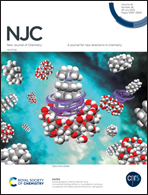Ruthenium(ii)-catalysed direct synthesis of mono-allylation products of 1,3-diketones from cinnamyl alcohols†
Abstract
The complex [Ru(p-cymene)(dppe)Cl]PF6·C7H8 has been synthesized and structurally characterized. It crystallizes in the orthorhombic non-centrosymmetric space group P212121 and undergoes auto-resolution. The complex is an efficient catalyst for direct carbon–carbon bond-formation reactions using cinnamyl alcohols to produce enantio- and regioselective mono-allylation products of diketones in high yield. A wide range of substrates provides good to excellent yields. The use of pyrrolidine and acetic acid additives increases the selectivity as well as prevents unwanted side products.



 Please wait while we load your content...
Please wait while we load your content...